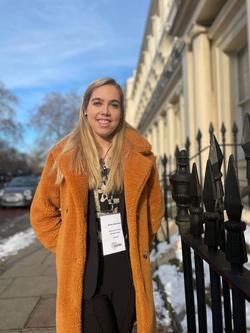Meet Early Career Microbiologist of the Year talk finalist: Emily Stevenson

What are your current research interests?
I am currently interested in how environmental plastic pollutants can spread diseases across aquatic systems and within the food chain. Specifically, my research focuses on unravelling the unique characteristics of plastics that drive colonisation dynamics of drug-resistant and pathogenic bacteria.
How did you feel finding out you are an Early Career Microbiologist of the Year finalist?
Honestly – I am extremely grateful and completely surprised. We all suffer from imposter syndrome, and it is only recently that I have felt confident/brave enough to call myself a microbiologist! I think it is so important to recognise early career researchers, and I am just thrilled to be a finalist.
As an early career microbiologist, what goals do you have your career?
I hope to follow that ‘typical’ academic journey; from PhD to postdoc, research fellow to lecturer, then finally senior lecturer to professor. Though, I also hope to include some not-so-typical elements. Impact is really important to me, so I hope to ensure policy, industry and community influence at every stage of my career.
Why does microbiology matter?
Microbes determine and drive everything. People seem to get so bogged down with issues and threats that seem so big, but we cannot overlook the small things that literally sustain everything we do, eat and breathe.
How do Society events, such as Annual Conference, promote your professional development?
My very first conference during my PhD was the Microbiology Society Annual Conference, and I felt so welcomed to the field immediately. Since, I have gone to several of the Society’s events and loved every single one of them. I now have friends and colleagues I look forward to seeing every year at these events, and make sure I have some cool findings ready each time the conference comes around so that I can share them!
You can find and follow Emily on Linkedin: Emily Stevenson
